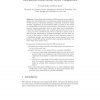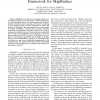66 search results - page 1 / 14 » Parallel Reducibility for Information-Theoretically Secure C... |
94
Voted
CRYPTO
2000
Springer
15 years 6 months ago
2000
Springer
Secure Function Evaluation (SFE) protocols are very hard to design, and reducibility has been recognized as a highly desirable property of SFE protocols. Informally speaking, reduc...
104
Voted
CORR
2008
Springer
15 years 2 months ago
2008
Springer
We present three voting protocols with unconditional privacy and information-theoretic correctness, without assuming any bound on the number of corrupt voters or voting authorities...
168
click to vote
DCOSS
2008
Springer
15 years 4 months ago
2008
Springer
We consider a mobile sensor network monitoring a spatio-temporal field. Given limited caches at the sensor nodes, the goal is to develop a distributed cache management algorithm to...
113
click to vote
ACSAC
2009
IEEE
15 years 9 months ago
2009
IEEE
—MapReduce has become increasingly popular as a powerful parallel data processing model. To deploy MapReduce as a data processing service over open systems such as service orient...
122
click to vote
CRYPTO
2005
Springer
15 years 8 months ago
2005
Springer
We study the question whether the sequential or parallel composition of two functions, each indistinguishable from a random function by non-adaptive distinguishers is secure agains...


